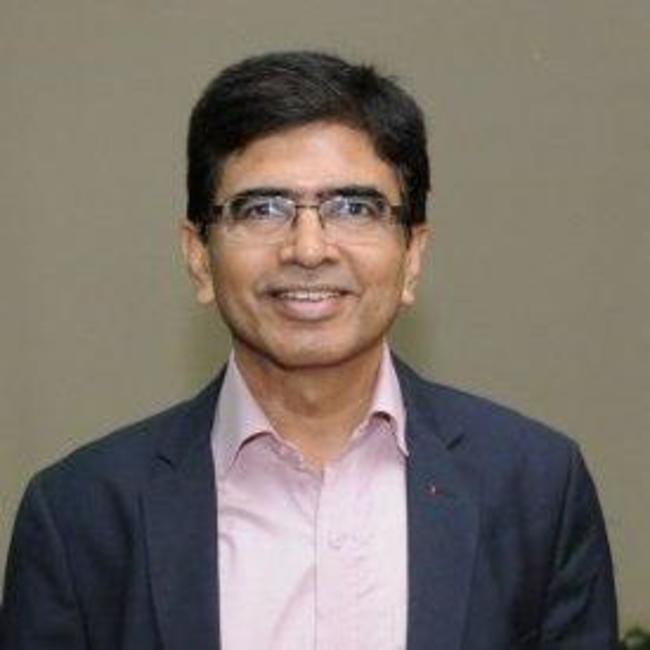
Prof. Pramod P. Wangikar is a faculty of the Department of Chemical Engineering in the Institute of Technology- Bombay (IIT-B). Prof. Wangikar obtained his Bachelor of Chemical Engineering from the Institute of Chemical Technology (ICT), Mumbai and then earned his Ph.D. from the University of Iowa, USA. His research interests include bioprocess development, biocatalysis and metabolic engineering of cyanobacteria. Dr. Wangikar has had a prolific research and teaching career resulting in the publication of more than 80 papers in renowned journals and the graduation of more than 18 PhD students. He has secured more than 10 grants over the tenure of his career and continues to be actively funded by government agencies, prominent industry partners and Indo-US collaborative funding agencies. He works closely with local industries to develop technologies that tackle many of the current needs of India. Currently, he is also heading two active research Centres: (1.) The Wadwani Research Centre for Bioengineering and (2.) The DBT-Pan IIT Centre for Bioenergy.
MISSION:
To make significant contributions to manpower training, knowledge creation and technology development and to be at the forefront in the areas of metabolic engineering and bioprocess development.
CAREER VISION:
To make significant contributions to manpower training, knowledge creation and technology development and to be at the forefront in the areas of metabolic engineering and bioprocess development.
RESEARCH INTERESTS:
RESEARCH STRATEGY:
LEADERSHIP ROLES:
Professor-in-Charge, Wadhwani Research Center for Bioengineering (WRCB), IIT Bombay; August 2014 – Present :-
WRCB has been set up at IIT Bombay as an inter-departmental virtual center with a generous donation from the Wadhwani Foundation (see http://www.iitb.ac.in/wrcb/en). The objective of WRCB is to promote innovation in bioengineering through translational research. WRCB aspires to be at the forefront of science and engineering research and become a leading center of excellence. Near term goals of WRCB include: (i) Expansion to include 10 core faculty and 20 Associate faculty members from the various Science and Engineering Departments of IIT Bombay (currently we have 5 core and 5 associate members), (ii) To develop infrastructure and space for WRCB, (iii) Secure government funding, (iv) Foster cross-disciplinary collaborations, (v) Create an ecosystem to undertake translational research, (vi) Promote entrepreneurship among researchers, (vii) Develop Corporate Affiliate Program (CAP) with the objective to promote interactions with industry partners. In IIT’s parlance, center director is known as Professor-in-charge (PIC) of WRCB. This is a leadership position at WRCB. As PIC, Prof. Wangikar is required to take a proactive role in ensuring that the overall goals of WRCB are defined in consultation with other stakeholders and achieved in a timely manner. He also works toward improving the visibility of WRCB among the academic and industry circles. He is also in charge of coordinating all activities of the center and interactions with the Wadhwani Foundation and the WRCB Advisory Board.
Coordinator, DBT-Pan IIT Center for Bioenergy; December 2014-Present:
DBT-Pan IIT Centre for Bioenergy is a virtual center funded by Department of Biotechnology (DBT), Government of India for 5 years (see http://www.che.iitb.ac.in/bioenergy). The center is coordinated by IIT Bombay and spread across Indian Institutes of Technology Bombay, Kharagpur, Guwahati, Rajasthan, and Roorkee. The research teams from the five participating Institutes consists of 32 investigators and has research activities in the following thematic areas: (i) Cyanobacterial biofuels, (ii) Biofuels from micro-algae, (iii) Ligno-cellulosic biomass to biofuels, and (iv) Techno-economic and life cycle assessment. Prof. Wangikar has played a significant role from conceiving the center, bringing together the co-investigators, writing the proposal and interfacing with the funding agency during the approval process. He coordinates the research and administrative activities of the center besides contributing to the research deliverables in his capacity as a lead PI.
Other network projects:
Prof. Wangikar has been a part of many network projects including public-private partnership (PPP) projects involving industry partners. He has actively coordinated many such projects. He is of the firm belief that network projects are likely to be the main mechanism by which funding agencies will award research grants in future.
COLLABORATIONS
Collaborators with current joint funding
⦁ Dr. R P Gaikaiwari, Hi Tech Bio Sciences Ltd., Pune, India
⦁ Dr. Santanu Dasgupta, Reliance Industries Ltd., India
⦁ Dr. Himadri Pakrasi, Washington University in St. Louis, St. Louis, USA
⦁ Dr. John Beardall, Monash University, Australia
⦁ Dr. Ashwani Pareek, Jawaharlal Nehru University, New Delhi, India
⦁ Dr. R Sowdhamini, NCBS, Bangalore, India
⦁ Dr. Uma Prabhakar, Bharathidasan Univsrsity, Trichi, India
⦁ Dr. U C Banerjee, NIPER, Mohali, India
Collaborators with recently concluded joint funding
⦁ Dr. Madhu Chetty, Monash University, Australia (Now with Federation University)
⦁ Dr. Alfonso Jaramillo, Evry University, France
⦁ Dr. Franck Chauvat, CEA Saclay, France
⦁ Dr. Anna Eliasson, DTU, Denmark.
Collaborators with whom conferences and workshops were jointly chaired
⦁ Dr. Louis Sherman, Purdue University, USA
⦁ Dr. Jay Keasling, University of California Berkeley, USA
⦁ Dr. Aindrila Mukhopadhyay, Lawrence Berkeley National Laboratory, USA
⦁ Dr. Mugdha Gadgil, NCL, Pune, India
⦁ Dr. Ashok Pandey, NIIST, Trivandrum, India
Collaborators with active links but without a current joint grant
⦁ Dr. Doug Allen, Danforth Plant Science Center, St. Louis, USA
⦁ Dr. Niels Friegard, Denmark
⦁ Dr. Mattheos Koffas, RPI, Troy, USA.